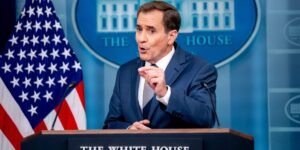No Labels, the outside organization aiming to field a centrist third-party presidential ticket, still can’t find the main ingredient to its long shot challenge: an actual candidate.
Former New Jersey Gov. Chris Christie became the latest high-profile politician to entertain the outside group’s courting only to reject their offer, The Washington Post first reported.
Sen. Joe Manchin, a West Virginia Democrat; and two Republicans, former Maryland Gov. Larry Hogan, a Republican, and former Georgia Lt. Gov. Geoff Duncan, also previously ruled out a third-party run. Hogan’s rejection was particularly notable given that he instead decided to run for the US Senate, a job the blue-state Republican once described as “just not something I’ve ever aspired to do.”
Other notable political figures, including former Congresswoman Liz Cheney, have sworn off all third-party challenges lest their legacies get tied to a potential “spoiler” candidacy that makes it easier for former President Donald Trump to return to the White House. Former UN Ambassador Nikki Haley, once Trump’s last standing major primary challenger, is also opposed to a third-party run.
Christie, according to Politico, was reportedly turned off due to concerns about the outside group’s finances and its preparation for such an ambitious challenge.
Christie’s concerns included the reported list of Democratic running mates that appears not to have been updated since 2020.
One name on the list, former Congresswoman Tulsi Gabbard, no longer considers herself a Democrat and could actually become Trump’s running mate. Former New York Gov. Andrew Cuomo is also included, despite the laundry list of Democrats that turned against him before he left office amid scandal.
No Labels has imposed a deadline next month to name its ticket. Nancy Jacobson, the group’s president, recently conceded to delegates that it may be unable to find a “gladiator” to be its presidential candidate, The New York Times reported.
No Labels did not immediately respond to Business Insider’s request for comment.
The Times also reported that retired Adm. William H. McRaven, former Secretary of State Condoleezza Rice, and former Congressman Will Hurd of Texas also rejected a spot on No Label’s ticket.
No Labels does not have to disclose its donors, but previously reported that it raised $60 million last year to support its effort. The outside group is currently funding an expansive ballot access effort, which is necessary since, unlike Biden and Trump and, to some extent, more established third parties, such access isn’t automatically assured.
No Labels is behind its previously stated timetable of being on the ballot in 27 states by the end of 2023.
According to the group, it has now qualified for the ballot or received access in 19 states. No Labels is on the verge of making the ballot in the critical state of Wisconsin and is already set to go in the battlegrounds of Arizona and Nevada. There are some headaches with that effort.
As CBS News previously reported, No Labels has to navigate the dance of not being a political party for tax reasons while, at the same time, qualifying for state ballots as an official third party.
Some states only allow for access for named candidates, meaning that if No Labels wants to be on the ballot in all 50 states, that effort would have to be completed by the future campaign, which also for legal reasons, will have to be separate from the group itself.
No Labels is different than other third-party challengers.
It is worth pointing out that No Labels is not alone.
Robert F. Kennedy Jr. abandoned his long shot Democratic primary challenge to Biden before pinning his aspirations on a third-party bid. Kennedy named his running mate, California attorney Nicole Shanahan, earlier this week. Liberal activist Cornel West also has his third-party bid. The Libertarian Party and the Green Party are also expected to nominate their nominees this summer.
But No Labels’ challenge is fundamentally different. It was originally founded as a centrist group in 2010 to promote bipartisanship by backing compromise legislation and the dealmaking lawmakers who help write it. The group even enlisted Akon, best known for teaming up with Enimem on their song “Smack That” in 2006, to pen its feel-good anthem.
Things were certainly different then.
Read the full article here

















